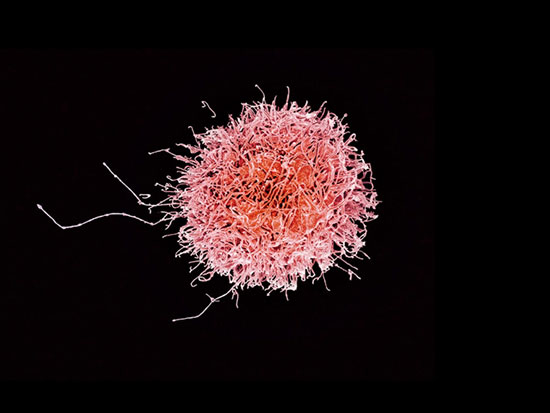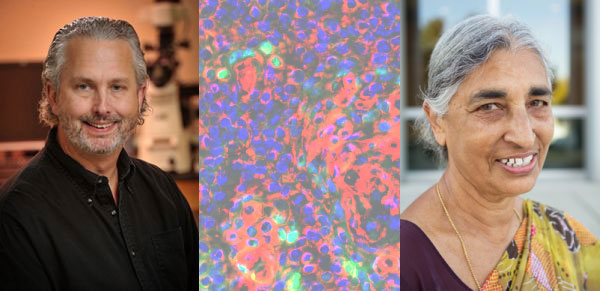 Harnessing the power of the immune system, including footsoldiers such as this natural killer cell, promises to bring treatments and even cures for some of our deadliest diseases. Image courtesy NIHIt doesn’t matter whether you live in Beverly Hills or a Brazilian favela — every human being is only a few inches away from disaster. From birth to death, on our arms, legs and everywhere else, each of us carries microbes that would love to get under our skin and reproduce, with potentially fatal results. A paper cut, an insect bite, an untimely rubbing of the eyes — it takes very little for bacteria, viruses and other invaders to get inside and start wreaking havoc.
Harnessing the power of the immune system, including footsoldiers such as this natural killer cell, promises to bring treatments and even cures for some of our deadliest diseases. Image courtesy NIHIt doesn’t matter whether you live in Beverly Hills or a Brazilian favela — every human being is only a few inches away from disaster. From birth to death, on our arms, legs and everywhere else, each of us carries microbes that would love to get under our skin and reproduce, with potentially fatal results. A paper cut, an insect bite, an untimely rubbing of the eyes — it takes very little for bacteria, viruses and other invaders to get inside and start wreaking havoc.
When that happens, the invaders are quickly surrounded by some of the billions of immune cells on constant patrol in our bodies. This finely coordinated attack is more complex than any human military organization. The immune system can be divided into two main categories — innate and adaptive — but there are LOTS of subdivisions: macrophages, natural killer cells, granulocytes, neutrophils, T and B cells, plasma cells, memory cells, regulatory T cells and so on. The list is long, and growing longer all the time with new discoveries. In recent years, researchers have learned how to target specific immune cells in new treatments for everything from cancer to rheumatoid arthritis. But there is much more to do.
Every year, hundreds of thousands of people die from infection by HIV, tuberculosis and the malaria-causing parasite Plasmodium. Although new checkpoint inhibitors have extended the lives of Jimmy Carter and many others, much more research is needed to help the 7+ million people worldwide who die each year from cancer. And heart disease, the leading cause of death on the planet, has a strong immune component as well.
“Essentially all human diseases have an immune component,” says Frances Lund, Ph.D., chair of the UAB School of Medicine Department of Microbiology. “The future cures or treatments for many of the diseases that are of national and global concern will be dependent on our ability to successfully modulate the immune system.”
With UAB’s new Undergraduate Immunology Program, which launches in fall 2017, students get a front-row seat to the life-and-death struggle going on inside us all — and an ideal springboard for careers in medicine, academic research, industry and more. “This is a cutting-edge major,” says Louis Justement, Ph.D., director of the program, and a professor in the microbiology department. “Students will get comprehensive experience in the scientific process, critical thinking, problem solving, scientific methodology and in communicating science. Our goal is to prepare students for the challenges and opportunities of the future — and build up a pipeline of young immunologists to tackle the pressing problems of the 21st century.”
Real science — as early as freshman year
The Undergraduate Immunology Program is the only one of its kind in the Southeast, and one of a handful in the country, notes Vithal Ghanta, Ph.D., the program’s co-director and a professor in the UAB College of Arts and Sciences Department of Biology. It is modeled on UAB’s Undergraduate Neuroscience Program, which has attracted elite students from across the country over the past eight years. Both programs are interdepartmental majors between the College of Arts and Sciences and School of Medicine.
“This represents a true collaboration between the departments of Biology and Microbiology,” says Lund. “We believe that this unique educational opportunity will not only attract students who are passionate about science and medicine, but will perfectly prepare those students to take on the scientific and clinical challenges of the 21st century here in Alabama and across the world.”
There are more than 100 faculty at UAB focusing on basic or clinical immunology, in 15 departments and four schools. Immunology and infectious diseases research at UAB is supported by $182 million in federal funding. “Immunology has always been one of the strongest areas of research here,” Justement says. Students will be able to choose among research opportunities in dozens of UAB labs, contributing to work that is targeting everything from cancer vaccines to next-generation asthma treatments. “Students coming through our program have the ability to be integral members of labs across campus,” Ghanta says. “They can start as early as the freshman year, depending on their experience and ability to handle other coursework.” By their junior year, all students in the major will be required to begin working in a UAB lab.
| “Essentially all human diseases have an immune component. The future cures or treatments for many of the diseases that are of national and global concern will be dependent on our ability to successfully modulate the immune system.” — Frances Lund, Ph.D., chair of the UAB Department of Microbiology |
The interaction between the College of Arts and Sciences and School of Medicine faculty is critical, Justement says. “Vithal and her colleagues know exactly how to work with undergraduates and help them learn.” Meanwhile, Justement has years of experience preparing leaders in the lab as associate director of UAB’s Medical Scientist Training Program. ”People like me on the graduate side, since we are constantly working with graduate students and medical students, know what it takes to succeed in those arenas, and have insight on how curricula can prepare undergraduates to achieve,” he says.
“Our goal is to give undergraduate students a very solid foundation,” adds Ghanta. “They will be exposed to the various sub-fields of immunology in graduate school or medical school; we want to make sure they have a solid foundation to build on.” Ghanta has taught a popular undergraduate immunology course in the Department of Biology for years. She says she regularly gets emails from former students who are now in medical school, “letting me know that having this undergraduate immunology really helps them."
How it works
The first two years of the program are largely focused on overall university requirements and foundational science courses. But in order to let students jump right in, Justement and Ghanta have designed Current Topics in Immunology, a “teaser course” that shines new light on hot topics in the media. Justement says he’ll tell the story of a doctor who was “cured” of Ebola but then almost lost his vision later, because the virus was able to survive within his eyes. “The reason is these are immune-privileged sites that need to be protected from the immune response, and it turns out the pathogen is able to take advantage of this,” he says.
In their second year, students will take part in a seminar where investigators from across the university will share details on research in their labs. “The students will get an idea of whose work sounds neat, who they would want to work with and why it’s important,” Justement says.
In their junior and senior years, students in the program will take in-depth courses that delve into the fundamental cellular and molecular processes that control the immune response. “This will provide them with a solid appreciation of how the immune system works as a whole,” Ghanta says. Then, she adds, students will build on this knowledge by further exploring the interactions between the immune system and pathogens that try to subvert, or escape, the normal surveillance mechanisms used to detect and destroy them. Finally, students will learn about the “dark side of the immune response,” Justement says. “When things go wrong it leads to numerous life-threatening diseases, including autoimmunity, asthma and chronic inflammation that in turn can cause heart disease, diabetes or cancer.”
 Louis Justement, Ph.D. (School of Medicine) and Vithal Ghanta, Ph.D. (College of Arts and Sciences) are veteran researchers and educators of young scientists. "This is a cutting-edge major," Justement says. "Our goal is to prepare students for the challenges and opportunities of the future."
Louis Justement, Ph.D. (School of Medicine) and Vithal Ghanta, Ph.D. (College of Arts and Sciences) are veteran researchers and educators of young scientists. "This is a cutting-edge major," Justement says. "Our goal is to prepare students for the challenges and opportunities of the future."Collaboration leads to competitive edge
Justement and Ghanta have formed a committee with the directors of the Undergraduate Neuroscience Program and leaders of the recently launched Undergraduate Program in Genetic and Genomic Sciences, and a new major in informatics that is now being developed. Soon, UAB will be able to offer students “a suite of biomedical undergraduate programs,” Justement says, “all well suited to preparing them for professional and graduate school."
There are many opportunities to “cross-fertilize” among the specialties, Justement adds. “There is neuro-immunology, tumor immunology and bioinformatics, just to name a few,” he says. “Students will be able to tailor their studies to the areas where they have the most interest. We’ll be able to make an amazing, unique educational experience even better.”
The Undergraduate Immunology Program will help retain top students from the Birmingham area, and throughout Alabama, Justement says. “But we’re also looking to expand our national footprint. UAB is creating a unique position in the world of undergraduate education."
